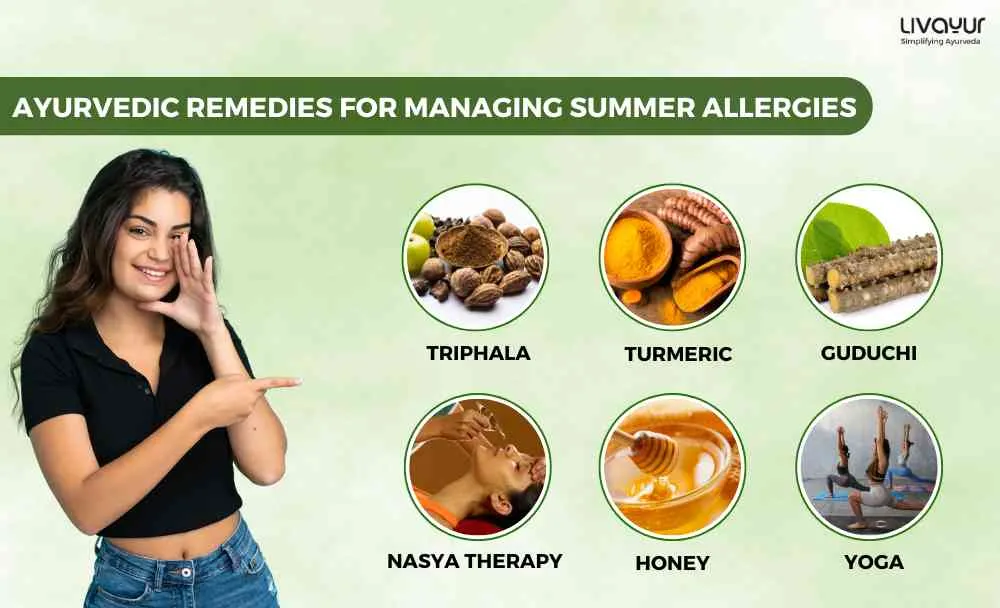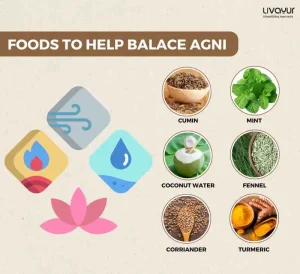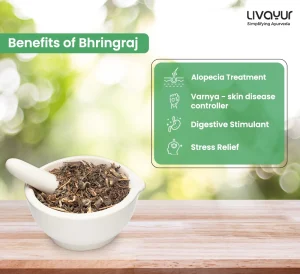
As the summer heat arrives, so do seasonal allergies, leaving many individuals seeking relief from symptoms such as sneezing, itching, and congestion. While conventional treatments offer temporary relief, Ayurveda, the ancient system of medicine from India, provides holistic solutions for managing allergies effectively. Explore how allergy treatment in Ayurveda can help alleviate summer allergies and promote overall well-being.
Understanding Allergies: The Ayurvedic Way
According to Ayurveda, allergies result from an imbalance in the body’s doshas, particularly Pitta and Kapha. Pitta governs digestion and metabolism, while Kapha regulates moisture balance and immunity. When these doshas become aggravated due to improper diet, stress, or environmental toxins, allergies manifest. [1]
Additionally, allergies occur in our body due to the low immune system and the presence of toxins (Ama). The Ama is the result of indigestion due to the reduced digestive fire. This in turn triggers the imbalance of rakta, pitta and Kapha that ultimately manifests as allergies. Hence, avoiding virudh ahar like spicy, hot, processed food is necessary to avoid the kapha and pitta doshas.
Types Of Allergies
According to Ayurvedic science, there are three major kinds of allergies – Kapha, Pitta and Vata. The imbalance of any of these elements is responsible for causing summer allergies. Here, we will discuss the allergies related to these three.
Kapha Related Allergy
This dosha is characterised by excessive mucus in the body hence the common allergies in this case are nasal congestion, itchy eyes, coughing, runny nose, dry skin, sinus infection, etc.
- Vata Related Allergy
Vata dosha refers to any allergy related to breathing, excretion, blood flow, cerebral fluid movement, etc. For instance, constipation, diarrhoea, headache, muscle ache, etc are usually considered Vata-related allergies.
- Pitta Related Allergy
Pitta is the fire element of our body hence allergies like vomiting, stomach upset, acid reflux, rashes, itchiness, eczema, etc. are all categorised under Pitta allergies.
Ayurvedic Herbs and Medicines for Allergies
Among the numerous cure options in Ayurveda, the three most effective medicines are adrak, vacha and lavanga. Others include turmeric, amla, ela, tulsi, cumin seeds, haritaki and bibhitaki formulation, cloves, bakuchi, and neem leaves etc.
These medicinal herbs and medicines are extremely fruitful and proven to work effectively for allergies like skin itchiness, cough and cold, headache, etc. Moreover, as they are naturally consumed, they leave no side effects for us to afterwards deal with.
However, it is always the best option to learn about the dosage from a professional practitioner so that you can maximise its abilities to your benefit.
Ayurvedic Approach to Allergy Treatment
Ayurvedic allergy treatment focuses on restoring balance to the doshas and strengthening the immune system to prevent allergic reactions. Here are some Ayurvedic remedies commonly used to manage summer allergies:
1. Triphala
Triphala, a combination of three fruits (amalaki, bibhitaki, and haritaki), is a natural detoxifier that cleanses the body of toxins that contribute to allergies. It also supports healthy digestion and strengthens the immune system, making it an effective allergy ayurvedic medicine. [2] [3]
2. Turmeric (Curcuma longa)
Turmeric, known for its anti-inflammatory and immune-boosting properties, helps alleviate allergic symptoms by reducing inflammation and strengthening immunity. Consuming turmeric powder with warm milk or incorporating it into meals can be a great allergy Ayurvedic cure. [4]
3. Nasya Therapy
Nasya, is one of the traditional Ayurvedic remedies for allergic rhinitis involving nasal administration of herbal oils, helps clear congestion and alleviate allergic rhinitis symptoms. Administering medicated oils such as sesame or ghee into the nasal passages lubricates the mucous membranes and reduces inflammation, relieving nasal congestion and allergies. [5]
4. Guduchi (Tinospora cordifolia)
Guduchi, also known as Amrit, is a powerful immune-modulator in Ayurveda. It helps strengthen the body’s defences against allergens and reduces allergic reactions by balancing Pitta and Kapha doshas. Consuming Guduchi powder or tablets regularly can help manage allergies effectively. [6]
5. Local Honey
In Ayurveda, consuming raw, local honey is believed to desensitize the body to pollen allergens and reduce allergic reactions. Incorporating a teaspoon of raw honey into your daily diet can help build immunity and alleviate allergy symptoms. [7]
6. Ayurvedic Diet and Lifestyle
Following a Pitta-pacifying diet and lifestyle can help prevent allergies by balancing Pitta dosha. This includes consuming cooling foods like fresh fruits, vegetables, and herbs, staying hydrated, regularly exercising, and managing stress through yoga and meditation. [8]
In conclusion, Ayurveda offers a holistic approach to managing summer allergies by addressing the root cause of imbalances in the body. By incorporating Ayurvedic remedies such as Triphala, turmeric, Nasya therapy, Guduchi, and local honey, and adopting a Pitta-pacifying diet and lifestyle, individuals can experience relief from allergic symptoms and enjoy a healthier, more vibrant life.
Remember to consult with a qualified Ayurvedic practitioner before starting any new herbal remedies or therapies, especially if you have existing health conditions or are pregnant or breastfeeding. With proper guidance and personalized treatment, allergy Ayurvedic treatment can provide effective relief from summer allergies and promote overall well-being.
In conclusion
Ayurveda offers a holistic approach to managing summer allergies by addressing the root cause of imbalances in the body. By incorporating Ayurvedic remedies such as Triphala, turmeric, Nasya therapy, Guduchi, and local honey, and adopting a Pitta-pacifying diet and lifestyle, individuals can experience relief from allergic symptoms and enjoy a healthier, more vibrant life.
Remember to consult with a qualified Ayurvedic practitioner before starting any new herbal remedies or therapies, especially if you have existing health conditions or are pregnant or breastfeeding. With proper guidance and personalized treatment, allergy Ayurvedic treatment can provide effective relief from summer allergies and promote overall well-being.
FAQs
What are the three main doshas related to allergy in Ayurveda?
The three major elements of the body are kapha, pitta and vata. Hence the imbalance in these three causes kapha, pitta and vata doshas i.e. allergies. The major ones are cough and cold, stomach upset, acid reflux, etc.
What are the major therapies for allergies in Ayurveda?
Some of the common ways of treating allergies in this case are using local honey, turmeric, Triphala, etc. Others include nasya therapy and maintaining a proper Ayurvedic lifestyle and diet.
What are the common herbs for treating allergies in Ayurveda?
The most common herbs used for curing allergies are adrak, tulsi, Ashwamedha, baheda, haritaki, cloves, etc.
What is the proper diet and lifestyle?
If you are planning to maintain a proper Ayurvedic lifestyle begin with eating healthy and fresh fruits and vegetables, drinking adequate water you can infuse with honey or tulsi, taking a light walk after each meal, getting proper sleep, meditating, indulging in yoga, keeping away from drinking, smoking and other intoxications.
References:
- Ayurveda and the battle against chronic disease: An opportunity for Ayurveda to go mainstream? | J Ayurveda Integr Med. 2010 Jan-Mar; 1(1): 9–12.
- The evaluation of the radioprotective effect of Triphala (an Ayurvedic rejuvenating drug) in the mice exposed to radiation | April 2002Phytomedicine 9(2):99-108
- A REVIEW ON ANTIMICROBIAL ACTIVITIES OF TRIPHALA AND ITS CONSTITUENTS | WORLD JOURNAL OF PHARMACY AND PHARMACEUTICAL SCIENCES
- Therapeutic Roles of Curcumin: Lessons Learned from Clinical Trials | AAPS J. 2013 Jan; 15(1): 195–218.
- Clinical investigations on the ayurvedic management of allergic rhinitis (Vataja pratishyaya) by Pratimarsha nasyaas nasal drug delivery system | Exploratory Animal and Medical Research, 2014, Vol. 4, No. 2, 194-205 ref. 25
- GUDUCHI; A POTENTIAL DRUG IN AYURVEDA | World Journal of Pharmaceutical Research
- Ingestion of honey improves the symptoms of allergic rhinitis: evidence from a randomized placebo-controlled trial in the East Coast of Peninsular Malaysia | Ann Saudi Med. 2013 Sep-Oct; 33(5): 469–475.
- Concept of Dietetics and its importance in Ayurveda | Journal of Ayurveda and Integrated Medical Sciences


























36 Comments